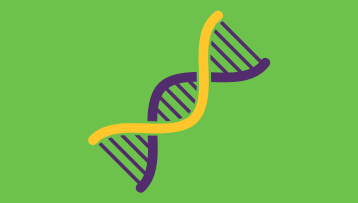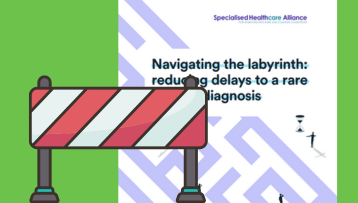NHS England recently unveiled its 10-Year Health Plan. This is a detailed report, discussing what NHS England wants to do over the next decade to improve health provision. The latest plan outlines significant changes that could transform care across England by 2035. Here, we highlight the aspects most relevant to the TSC community
More integrated and local care
A core priority of the new plan is shifting support from hospitals into more community-based settings. NHS England calls this its ‘Neighbourhood Health Service’. This change aims to mean that you’ll get more personalised and accessible care that’s closer to home. This might mean that you go to appointments closer to where you live, in places that aren’t hospitals (such as a health centre). The places offering this care will be open at least 12 hours a day, six days a week.
NHS England hopes that this change will mean that its care will be more preventative, with issues picked up before they become bigger problems. It might also streamline care and reduce waiting times.
What this might mean for the TSC community: You’ll not have to juggle so many appointments, or have to travel so far, for TSC-based checkups and scans. It should also mean that different healthcare professionals work more closely with each other, so they understand your health needs more easily.
A greater focus on the NHS app
The NHS App will undergo significant enhancements, allowing easier management of appointments, prescriptions and other health information. People will be able to gain secure access to their own medical records more easily. This will hopefully mean simpler communication with healthcare providers.
What this might mean for the TSC community: You might have lots of health records in lots of places, for different symptoms and things related to TSC. This can be hard to track, including for doctors and nurses. The change should mean that your medical history is much easier to access, so that you get better care. However, this will only work providing that the NHS app is useable for everyone – there’s question marks over how this will work for people who might have a carer. For example, will the carer be able to access the records of the person they care for on their behalf?
Improved access to specialist treatments
The plan includes a strong focus on harnessing innovation, particularly genomics and AI, to personalise treatment and predict health risks more effectively. NHS England aims to become a global leader in genomics, offering universal newborn genomic testing by 2030. AI will be seen as the clinician’s “trusted assistant”, helping to make care more impactful and streamlined.
What this might mean for the TSC community: A lot remains to be seen about how this will work in practice. However, we’re hopeful that it might mean earlier diagnosis and subsequent treatment into TSC. For example, it may mean that a newborn is confirmed as having TSC earlier, meaning care can be given quicker. For adults with TSC, it could mean better ongoing treatment and management of TSC symptoms. It might even mean the possibility of AI recognising patterns in TSC that aren’t identified right now. Much more needs to be confirmed about AI in the plan.
A stronger focus on prevention and early intervention
Right now, NHS England is very reactive. This means treating things that are already not right, such as a TSC tumour that has already grown to a size that it’s causing problems. NHS England wants to instead move into a system focused on proactive prevention. This includes increased use of predictive healthcare, use of wearables and technology that continuously monitors people. It’s hoped that this will allow NHS England to catch and address health problems before they escalate.
What this might mean for the TSC community: We know that the way TSC affects someone can change a lot over time. For example, new TSC-related growths might appear in someone’s kidneys, even if that person’s never TSC-related kidney problems before. If NHS England is able to monitor changes in the body more quickly, it would mean that these kidney growths can be spotted when they’re small, perhaps making treatment to halt or reduce its progression more impactful.
Better mental health support
There is a pledge for substantial investment in mental health care. This includes more dedicated mental health emergency services, access to therapists 24/7 virtually for mild to moderate issues, and more mental health self-referral. Expanded mental health support teams in schools will also provide additional support for young people, addressing mental health needs early. NHS England hopes this will ensure faster access to specialist care, while also reducing strain on Accident and Emergency departments.
What this might mean for the TSC community: We now know that TSC-Associated Neuropsychiatric Conditions (TAND) is a massive challenge for many people in the TSC community. Despite this, at present it can be very hard for people to access the specialist support that they need. These changes will hopefully mean more equitable and impactful mental health support across England for people with TSC.
The TSA’s view on the 10-Year Health Plan
The current health system in England doesn’t adequately support everyone in the TSC community as much as it should. The ambitious 10-Year Health Plan represent substantial opportunities for improved healthcare access, management, and outcomes for individuals and families living with TSC. In particular, the focus on more integrated and local care – free from the current challenges of different clinicians not having access to different pieces of information – may mean a domino effect of greater long-term health opportunities.
Ultimately, writing plans on paper is all well and good. The real challenge is in making these ideas an actual, tangible reality. The TSA welcomes these plans but eagerly anticipates proof that they’ll actually happen, and not diluted over time. The plan as a whole is frustratingly light in discussing rare diseases, with “rare” appearing just eight times in the full report – this in itself is completely unacceptable to us. We as a charity will do everything that we can to hold NHS England to account, based on their now agreed commitments and hopes.








































































































































